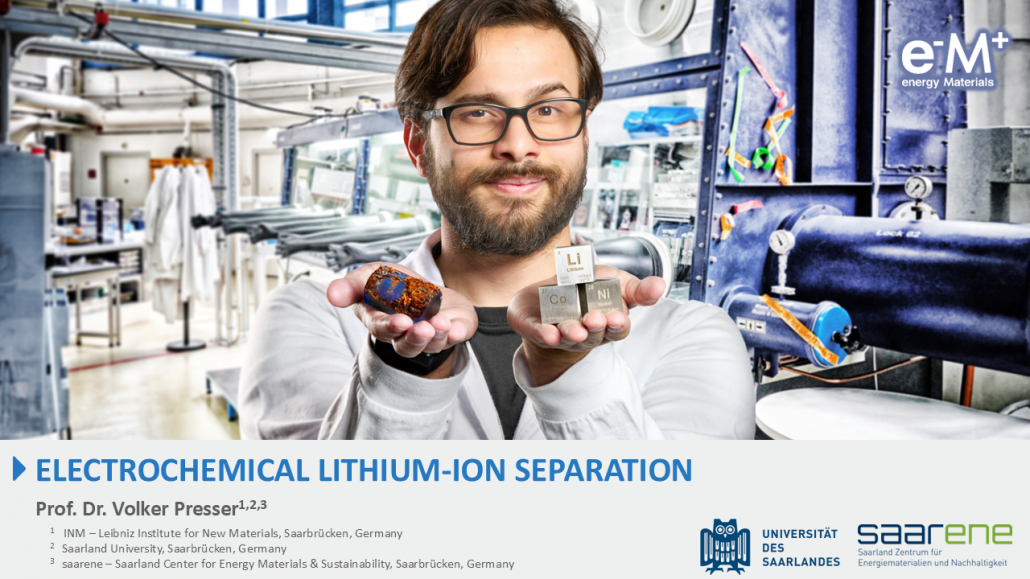Volker Presser gives an oral presentation titled “Electrochemical Lithium-Ion Separation” at the Symposium on Direct Lithium-Extraction (SDLE) at the Karlsruhe Institute of Technology (Germany).

Volker Presser gives an oral presentation titled “Electrochemical Lithium-Ion Separation” at the Symposium on Direct Lithium-Extraction (SDLE) at the Karlsruhe Institute of Technology (Germany).

Our latest research in Energy & Environmental Science explores an eco-friendly, high-performance lithium-ion anode made from self-assembled organic nanowires. By evaporating water on a copper current collector, we achieved a nanowire network without harmful solvents, enhancing lithium-ion diffusion and storage capabilities. The result? The self-assembled organic nanowire anode delivers a remarkable lithium storage capacity of up to 1888 mA h/g at 0.1 A/g, retaining 508 mA h/g even at a high current rate of 10 A/g. In lithium-ion capacitors, it achieves a specific energy of 156 W h/kg at 0.34 kW/kg and maintains 60.2 W h/kg at 19.4 kW/kg, outperforming many state-of-the-art systems.
This Czech-German research collaboration was carried out by Ievgen Obraztsov, Rostislav Langer, Jean G. A. Ruthes, Volker Presser, Michal Otyepka, Radek Zboril, and Aristides Bakandritsos.

Our new paper, Electrochemical recycling of lithium-ion batteries: Advancements and future directions, is now available online at the Wiley journal EcoMat. Our review provides a perspective of different recycling techniques currently used for lithium-ion batteries. We begin by reviewing the more established pyrometallurgical and hydrometallurgical methods, which have been widely adopted in industrial applications. These methods, while effective, often involve high energy consumption and the use of chemical reagents, raising concerns about their long-term sustainability.
Building on this foundation, we focus on emerging electrochemical approaches, which offer a more sustainable alternative by using electricity to recover valuable metals like lithium, cobalt, and nickel. This method reduces the need for harmful chemicals and promises lower energy demands, especially when powered by renewable energy sources. However, despite these advantages, electrochemical recycling is not without its challenges. Our paper critically examines key issues such as scalability and selectivity. We emphasize the need for further research to address these obstacles and unlock the full potential of electrochemical recycling to improve metal recovery efficiency while minimizing waste and environmental impact.
In the broader context of the energy transition, efficient battery recycling is becoming increasingly important. As demand for electric vehicles and renewable energy storage rises, ensuring the sustainable recovery of metals like lithium, cobalt, and nickel is crucial. While electrochemical methods are promising, significant technical challenges remain to be addressed before these processes can be widely adopted. We believe our work contributes to a deeper understanding of the current landscape and offers insights into future directions.

New paper published on cation separation during flow electrode capacitive deionization in Desalination. This work is about improving water treatment and resource recovery through selective ion removal using flow electrode capacitive deionization (FCDI). We explore separating specific cations like calcium and magnesium from multi-ion solutions, helping to optimize water desalination processes. Our data show that while the overall ion separation order follows a universal order, the kinetics (down to full ion depletion) can be adjusted as a function of carbon mass loading, presence or absence of conductive additive, and flow rate.

Volker Presser delivers an invited (online) talk on “Electrode design of supercapacitors (and beyond)” at the 1st International Conference of Advanced Energy and Functional Materials Research (AEFM 2024) in Ilmenau, Germany.
